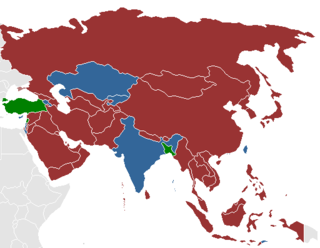Related Research Articles

Sex trafficking is human trafficking for the purpose of sexual exploitation. It has been called a form of modern slavery because of the way victims are forced into sexual acts non-consensually, in a form of sexual slavery. Perpetrators of the crime are called sex traffickers or pimps—people who manipulate victims to engage in various forms of commercial sex with paying customers. Sex traffickers use force, fraud, and coercion as they recruit, transport, and provide their victims as prostitutes. Sometimes victims are brought into a situation of dependency on their trafficker(s), financially or emotionally. Every aspect of sex trafficking is considered a crime, from acquisition to transportation and exploitation of victims. This includes any sexual exploitation of adults or minors, including child sex tourism (CST) and domestic minor sex trafficking (DMST).

Kevin Brian Bales,, is Professor of Contemporary Slavery at the University of Nottingham, co-author of the Global Slavery Index, and was a co-founder and previously president of Free the Slaves, the US sister organization of Anti-Slavery International.
The Coalition Against Trafficking in Women (CATW) is an international non-governmental organization opposing human trafficking, prostitution, and other forms of commercial sex.
Sonagachi is a neighbourhood in Kolkata, India, located in North Kolkata near the intersection of Jatindra Mohan Avenue with Beadon Street and Sovabazar, about one kilometer north of the Marble Palace area. Sonagachi is among the largest red-light districts in Asia with several hundred multi-storey brothels residing more than 16,000 commercial sex workers.

Prostitution is legal in India, but a number of related activities including soliciting, kerb crawling, owning or managing a brothel, prostitution in a hotel, child prostitution, pimping and pandering are illegal. There are, however, many brothels illegally operating in Indian cities including Mumbai, Delhi, Kolkata, Bangalore, and Chennai. UNAIDS estimate there were 657,829 prostitutes in the country as of 2016. Other unofficial estimates have calculated India has roughly 3–10 million prostitutes. India is widely regarded as having one of the world's largest commercial sex industry. It has emerged as a global hub of sex tourism, attracting sex tourists from wealthy countries. The sex industry in India is a multi-billion dollar one, and one of the fastest growing.
Laura María Agustín is an anthropologist who studies undocumented migration, informal labor markets, trafficking, and the sex industry. Blogging and speaking publicly as the Naked Anthropologist, she is critical of the conflation of the terms "human trafficking" and "prostitution". She argues that what she calls the "rescue industry" often ascribes victim status to people who have made conscious and rational decisions to migrate knowing they will be selling sex, and who do not consider themselves to be victims. She states that such views on prostitution originate in what she calls "fundamentalist feminism". She advocates for a cultural study of commercial sex, a theoretical framework she created in the journal Sexualities in 2005.

Contemporary slavery, also sometimes known as modern slavery or neo-slavery, refers to institutional slavery that continues to occur in present-day society. Estimates of the number of enslaved people today range from around 38 million to 49.6 million, depending on the method used to form the estimate and the definition of slavery being used. The estimated number of enslaved people is debated, as there is no universally agreed definition of modern slavery; those in slavery are often difficult to identify, and adequate statistics are often not available.
Rhacel Salazar Parreñas is Professor of Sociology and Gender Studies at University of Southern California. She previously taught at Brown University, the University of California, Davis and the University of Wisconsin–Madison. Her research has been featured in NPR's "The World", Bloomberg News, The New York Times, the Wall Street Journal, de Volkskrant, and the American Prospect. Parreñas has written five monographs, co-edited three anthologies, and published a number of peer-reviewed articles.

Siddharth Kara is a British Academy Global Professor and an associate professor at the University of Nottingham. He is best known for his book "Cobalt Red: How the Blood of the Congo Powers Our Lives" (2023). He has also published a trilogy on modern slavery: Sex Trafficking: Inside the Business of Modern Slavery (2009), Bonded Labor: Tackling the System of Slavery in South Asia (2012), and Modern Slavery: A Global Perspective (2017).
The Philip Leverhulme Prize is awarded by the Leverhulme Trust to recognise the achievement of outstanding researchers whose work has already attracted international recognition and whose future career is exceptionally promising. The prize scheme makes up to thirty awards of £100,000 a year, across a range of academic disciplines.
Shirin M. Rai, is an interdisciplinary scholar who works across the political science and international relations boundaries. She is known for her research on the intersections between international political economy, globalisation, post-colonial governance, institutions and processes of democratisation and gender regimes. She was a professor of politics and international studies at the University of Warwick, and is the founding director of Warwick Interdisciplinary Research Centre for International Development (WICID).
Janet Elizabeth Halley is an American legal scholar in the traditions of critical legal studies, legal realism and postmodernism. A self-described feminist, she is known for her critique of American feminism, dominance feminism, and left legalism, as well as her work on family law and the regulation of sexuality. She has also been a prominent voice in the public debate regarding sexual conduct codes on campuses in the United States in recent years, arguing against the broadening of the definition sexual assault and the adoption of the affirmative consent standard. She was the first expert on gender and sexuality in the legal system to receive a position at Harvard University and is the Royall law professor at Harvard Law School.
Elisabeth Marjolijn (Elselijn) Kingma is a Dutch philosopher. She is a professor at King's College London where she holds the Peter Sowerby Chair in Philosophy and Medicine.
Robyn Bourgeois is a mixed-race Cree activist, academic, author, and educator. She currently resides in Haudenosaunee, Anishinabe, and Huron-Wendat territory in Canada.

Carceral feminism is a critical term for types of feminism that advocate for enhancing and increasing prison sentences that deal with feminist and gender issues. It is the belief that harsher and longer prison sentences will help work towards solving these issues. The phrase "carceral feminism" was coined by Elizabeth Bernstein, a feminist sociologist, in her 2007 article, "The Sexual Politics of the 'New Abolitionism'". Examining the contemporary anti-trafficking movement in the United States, Bernstein introduced the term to describe a type of feminist activism which casts all forms of sexual labor as sex trafficking. She sees this as a retrograde step, suggesting it erodes the rights of women in the sex industry, and takes the focus off other important feminist issues, and expands the neoliberal agenda.
Elizabeth Bernstein is an American sociologist who is noted for her studies that focus on women, gender, and sexuality. She is also a professor at Columbia University's Barnard College.

Feminist perspectives on sex markets vary widely, depending on the type of feminism being applied. The sex market is defined as the system of supply and demand which is generated by the existence of sex work as a commodity. The sex market can further be segregated into the direct sex market, which mainly applies to prostitution, and the indirect sex market, which applies to sexual businesses which provide services such as lap dancing. The final component of the sex market lies in the production and selling of pornography. With the distinctions between feminist perspectives, there are many documented instances from feminist authors of both explicit and implied feminist standpoints that provide coverage on the sex market in regards to both "autonomous" and "non-autonomous" sex trades. The quotations are added since some feminist ideology believe the commodification of women's bodies is never autonomous and therefore subversive or misleading by terminology.
Donna Yates is an archaeologist and Associate Professor in the Department of Criminal Law and Criminology at Maastricht University. Her research considers transnational illicit trade in cultural objects, art and heritage crime including Looted art and the Antiquities trade, and white collar crime.
Sarah M.H. Nouwen is an academic in the areas of international law of peacemaking and justice. She is a professor of international law at the European University Institute, Florence, Italy, in the Department of Law, on leave as a reader in international law and Fellow of the Lauterpacht Centre for International Law at the University of Cambridge and Fellow of Pembroke College, Cambridge. She is also an editor-in-chief of the European Journal of International Law.
Carrie N. Baker is an American lawyer, Sylvia Dlugasch Bauman Professor of American Studies, and Chair of the Program for the Study of Women and Gender at Smith College in Northampton, Massachusetts. She teaches courses on gender, law, public policy, and feminist activism and is affiliated with the American Studies program, the archives concentration, and the public policy minor. She co-founded and is a former co-director of the certificate in Reproductive Health, Rights, and Justice Program offered by the Five College Consortium.
References
- ↑ "Prabha Kotiswaran - Biography - Research Portal, King's College, London". kclpure.kcl.ac.uk. Retrieved 2020-06-27.
- ↑ "PREPARING FOR CIVIL DISOBEDIENCE: INDIAN SEX WORKERS AND THE LAW". www.bc.edu. Retrieved 2020-06-27.
- ↑ Kotiswaran, Prabha (2011-07-25). Dangerous Sex, Invisible Labor. ISBN 978-0-691-14251-7.
- ↑ "Governance Feminism: An Introduction". University of Minnesota Press. Retrieved 2020-06-27.
- ↑ ":::Welcome to the official website of Women Unlimited:::". www.womenunlimited.net. Retrieved 2020-06-27.
- ↑ "Towards an Economic Sociology of Law | Wiley". Wiley.com. Retrieved 2020-06-27.
- ↑ "Revisiting the Law and Governance of Trafficking, Forced Labor and Modern Slavery - Cambridge University Press". www.cambridge.org. Retrieved 2020-06-27.
- ↑ Halley, Janet; Kotiswaran, Prabha; Rebouché, Rachel; Shamir, Hila (2019). Governance Feminism: Notes from the Field. University of Minnesota Press. ISBN 978-1-4529-5868-2.
- ↑ "Prabha Kotiswaran: 'The Sexual Politics of Anti-trafficking Discourse'". Oxford Law Faculty. 2019-04-09. Retrieved 2020-06-27.
- ↑ "Prizewinners". www.slsa.ac.uk. Retrieved 2020-06-27.
- ↑ "Philip Leverhulme Prizes 2014 | The Leverhulme Trust". www.leverhulme.ac.uk. Retrieved 2020-06-27.